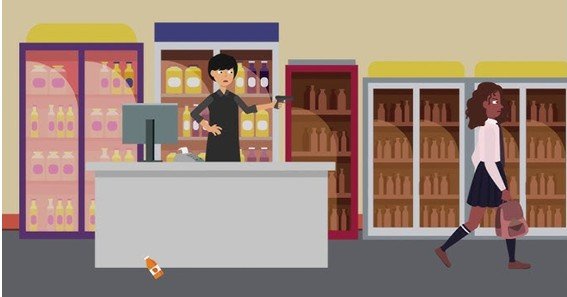In the case of People v. Du, Soon Ja Du, a Korean-American convenience store owner in Los Angeles, was convicted of voluntary manslaughter for the fatal shooting of 15-year-old Latasha Harlins on March 16, 1991. Despite the jury’s guilty verdict, the presiding judge sentenced Du to ten years in state prison but suspended the sentence, opting instead to place her on probation. This decision sparked significant controversy and is often cited as a contributing factor to the 1992 Los Angeles riots.
Incident Overview
On the morning of March 16, 1991, Latasha Harlins entered the Empire Liquor Market, owned by Soon Ja Du and her family. Harlins selected a bottle of orange juice and placed it in her backpack, approaching the counter with money in hand. Du, suspecting an attempted theft based on prior experiences with shoplifters, confronted Harlins. A physical altercation ensued, during which Harlins struck Du multiple times. As Harlins turned to leave, Du retrieved a revolver from behind the counter and shot Harlins in the back of the head, resulting in her immediate death. Harlins was found clutching two dollar bills in her hand.
Legal Proceedings and Sentencing
Du was charged with voluntary manslaughter. During the trial, the defense argued that Du acted in self-defense, citing previous threats and robberies at the store. The prosecution contended that Du’s use of lethal force was unjustified, especially as Harlins was unarmed and attempting to leave. The jury found Du guilty of voluntary manslaughter, a conviction that typically carries a substantial prison sentence. However, Judge Joyce Karlin sentenced Du to ten years in state prison, then suspended the sentence, placing her on probation with community service and a fine. Judge Karlin cited factors such as Du’s lack of a prior criminal record and the belief that she was unlikely to reoffend.
Public Reaction and Aftermath
The lenient sentencing in People v. Du led to widespread public outrage, particularly within the African-American community, who viewed the decision as a miscarriage of justice and indicative of systemic racial biases in the legal system. This case, along with the subsequent acquittal of LAPD officers in the Rodney King beating, is often referenced as a catalyst for the 1992 Los Angeles riots.
FAQs
1. What was the outcome of the People v. Du case?
Soon Ja Du was convicted of voluntary manslaughter for the shooting of Latasha Harlins. She received a suspended ten-year prison sentence and was placed on probation.
2. Why did Judge Joyce Karlin suspend Du’s prison sentence?
Judge Karlin considered factors such as Du’s lack of prior criminal history and the assessment that she was unlikely to commit future offenses.
3. How did the public react to the sentencing in People v. Du?
The sentencing sparked significant public outrage, particularly within the African-American community, who perceived it as unjust and indicative of racial bias in the legal system.
4. What impact did the People v. Du case have on Los Angeles?
The case is often cited as a contributing factor to the 1992 Los Angeles riots, highlighting tensions between different racial communities and dissatisfaction with the justice system.
5. What were the main arguments during the trial?
The defense argued that Du acted in self-defense due to prior threats and robberies, while the prosecution maintained that the use of lethal force was unjustified as Harlins was unarmed and attempting to leave.
The People v. Du case remains a significant example of how legal decisions can influence public perception and social dynamics, underscoring the importance of equitable justice in a diverse society.










